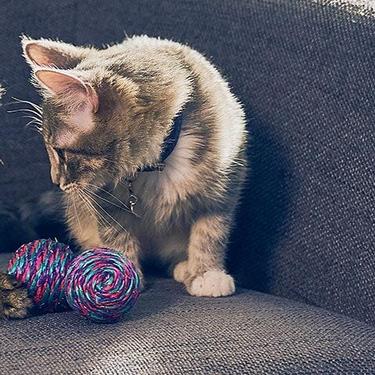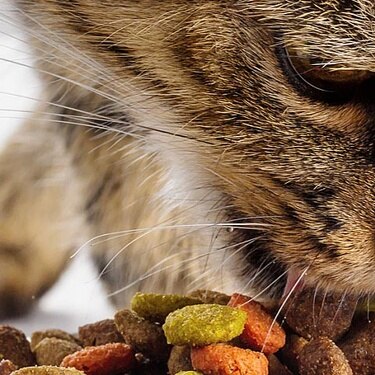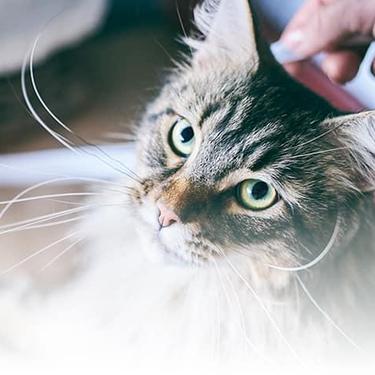
-
Find the right food for your petTake this quiz to see which food may be the best for your furry friend.Find the right food for your petTake this quiz to see which food may be the best for your furry friend.Featured products
 Perfect Digestion Small & Mini Adult Dog Food
Perfect Digestion Small & Mini Adult Dog FoodHill's Science Plan Perfect Digestion Small & Mini Adult Dog Food with Turkey is a complete premium pet food for small breed adult dogs aged 1–6 years. This deliciously smooth mousse is precisely balanced to deliver the appropriate amount of energy and to support digestive health in adult, small breed dogs.
Shop Now Sensitive Stomach & Skin Dog Food
Sensitive Stomach & Skin Dog FoodHill's Science Plan Sensitive Stomach & Skin Adult Wet Dog Food with Chicken is a complete premium dog food for adult dogs from 1 year. This savoury tinned loaf is enriched with ingredients that support digestive health & skin care.
Shop Now Perfect Weight Small & Mini Adult Dog Food
Perfect Weight Small & Mini Adult Dog FoodHill's Science Plan Adult Small & Mini Dog Food with Turkey is a complete premium pet food for adult small dogs from 1 year old that are prone to weight gain or slightly overweight. This deliciously smooth mousse is formulated to deliver the appropriate amount of energy to support weight maintenance in adult dogs.
Shop NowFeatured products Light Adult Multipack Wet Cat Food with Chicken & Ocean Fish
Light Adult Multipack Wet Cat Food with Chicken & Ocean FishTender chicken chunks in gravy for cats, with L-carnitine and fewer calories for ideal weight management. Packed with high-quality protein, omega-6s, and vitamin E for shiny fur and healthy skin.
Shop Now Adult Multipack Wet Cat Food with Beef, Ocean Fish & Chicken
Adult Multipack Wet Cat Food with Beef, Ocean Fish & ChickenTender chunks in gravy for cats, with high-quality protein to maintain lean muscle. With vitamin E and omega-3s & -6s for healthy skin and balanced minerals to support healthy vital organs.
Shop Now Mature Adult Wet Cat Food with Chicken
Mature Adult Wet Cat Food with Chicken
Tender chicken chunks in gravy for mature adult cats. Made with easy-to-digest ingredients, high-quality protein for lean muscle maintenance and antioxidant vitamins C+E for optimal health.
Shop Now -
Dog
- Dog Tips & Articles
-
Health Category
- Weight
- Food & Environmental Sensitivities
- Urinary
- Digestive
- Joint
- Kidney
-
Life Stage
- Puppy Nutrition
- Adult Nutrition
- Senior Nutrition
Cat- Cat Tips & Articles
-
Health Category
- Weight
- Skin & Food Sensitivities
- Urinary
- Digestive
- Kidney
-
Life Stage
- Kitten Nutrition
- Adult Nutrition
Featured articles Show some love with wet foods: a great choice for pets with health issues
Show some love with wet foods: a great choice for pets with health issuesShow some love with wet foods: a great choice for pets with health issues.
Read More The Right Diet For Your Pet
The Right Diet For Your PetIn people, the right diet is very important. If you are eating the wrong way for your metabolism, activity level, age and lifestyle you could end up with health issues.
Read More The Incredible Science Behind Your Pet's Microbiome
The Incredible Science Behind Your Pet's MicrobiomeLearn what your pet's microbiome is, how it contributes to your pet's gut and overall health, and why nutrition is important in maintaining healthy microbiomes.
Read More -


Adopting a new kitten means going through many milestones together, including bringing your cat home for the first time, litter training, and introductions to other animals, to name but a few. Other important first steps will take place at your vet’s clinic. From vaccinations to spaying and neutering, being a new pet parent comes with many new responsibilities.
One vital part of your kitten’s journey to becoming the best and healthiest version of themself is their vaccination schedule. To help you prepare, here's a list of the most common kitten vaccinations vets recommend and why they're important for your new family member. Educate yourself first, and then work with your vet to create a vaccine schedule that’s right for your family.
When do kittens need vaccinations?
Did you know a kitten's disease-fighting ability begins with a healthy mother cat? According to International Cat Care, the protection that kittens get from their vaccinated mothers wears off by six to eight weeks of age. This is why most vaccination schedules start at eight to nine weeks of age so that the maternal protection doesn’t interfere with how the vaccine works. Second vaccinations are usually recommended three to four weeks later, and some vets will recommend a third booster at 16 to 20 weeks of age for certain vaccines.
If you adopt a cat older than that, your vet will help you decide what vaccines are recommended for the country you live in, what age you should begin with the injections, and when they need to be repeated.

Potential Vaccinations Your Cat or Kitten May Receive
Vaccinations fall into two categories: core and non-core vaccines. Core vaccines are considered essential all over the world or in places where diseases are endemic (regularly seen). Non-core vaccines vary depending on where you live. Diseases and vaccinations are ever evolving, but the World Small Animal Veterinary Association (WSAVA), produces very detailed and useful vaccination guidelines and keeps them updated if you are ever unsure of what your cat or kitten may need.


Tasty Tips
Core Vaccines for Cats
Panleukopenia. Also known as feline parvovirus or feline distemper, this disease is highly contagious in cats and is often fatal. It is often passed from an untreated mother cat to her kittens and is so widespread that virtually every cat will come into contact with it at some point in their lives.
Feline Calicivirus. This is one of the most common respiratory illnesses, and young kittens are especially susceptible to it. Signs of this disease include swollen face and joints, hair loss, and scabbed or ulcerated skin. Feline calicivirus can also attack internal organs, like the lungs, pancreas and liver.
Feline Herpesvirus Type 1. The feline herpesvirus causes conjunctivitis and upper respiratory issues in cats, which is why it's considered a core vaccine for your kitten. Also called viral rhinotracheitis, this disease can infect cats of all ages. However, just like any herpesvirus, it's species-specific, so this variation can only affect your cat or kitten — not you or other types of pets, like dogs, birds or fish.
- Feline Leukaemia.
This vaccine is considered core in cats under a year of age, older cats that are at risk, and cats living in areas where the disease is very prevalent. Ask your vet what category of cat yours falls into and then together, you can decide whether to vaccinate or not.
- Rabies.
The rabies virus is spread through the saliva of a sick animal and can affect mammals ranging from dogs and cats to bats and foxes. Undetected rabies is extremely dangerous to humans. The UK is rabies-free but a rabies vaccination is a legal requirement for cats travelling abroad or returning to the UK under the Pet Travel Scheme. Vaccination is considered core where rabies is endemic.
Non-Core Vaccines for Cats
Bordetella. Often referred to as kennel cough in dogs, bordatella is a highly contagious respiratory disease, which is why many vets will recommend getting the vaccine. It can be transmitted by sneezing and coughing and is especially an issue in multi-cat families. However, remember that your kitten can contract it prior to adoption, especially if raised in a place with other kittens or adult cats. This is not a common vaccination in Europe, and under no circumstances should your cat ever receive the canine vaccination.
Chlamydia felis. A chlamydia infection is usually passed by close contact with other cats. Unlike other feline respiratory illnesses, chlamydia is not usually fatal. It most often presents with red, swollen or runny eyes, according to the European Advisory Board on Cat Diseases, and may require antibiotic treatment. The chlamydia vaccine is not a core one, but your vet might recommend it.

Talk to Your Vet
It can be tough to make a decision on which of these kitten vaccinations is right for your new pet, which is why you should always consult your vet for advice. Your veterinarian will ask questions about your kitten's lifestyle and your home environment to help make their recommendations. Some common questions include:
Did you get your kitten from? For example, was it a stray, or did you get it from a shelter or breeder?
Was your kitten raised with other animals before? If so, which species?
What other animals do you have in your home?
Are you planning on travelling with your kitten or possibly boarding them while you travel?
Remember to answer any questions honestly, even if you're not sure of the answer. The more information you provide to the vet, the better they will be able to help you decide which vaccines your new family member should receive.


Erin Ollila believes in the power of words and how a message can inform—and even transform—its intended audience. Her writing can be found all over the internet and in print, and includes interviews, ghostwriting, blog posts, and creative nonfiction. Erin is a geek for SEO and all things social media. She graduated from Fairfield University with an M.F.A. in Creative Writing. Reach out to her on Twitter @ReinventingErin or learn more about her at http://erinollila.com.
Related products

Tender chicken chunks in gravy for cats, with L-carnitine and fewer calories for ideal weight management. Packed with high-quality protein, omega-6s, and vitamin E for shiny fur and healthy skin.

Tender chicken chunks in gravy for mature adult cats. Made with easy-to-digest ingredients, high-quality protein for lean muscle maintenance and antioxidant vitamins C+E for optimal health.


Tender chunks in gravy for cats, with high-quality protein to maintain lean muscle. With vitamin E and omega-3s & -6s for healthy skin and balanced minerals to support healthy vital organs.
Related articles

Kittens grow a lot in their first year, so it is important to provide them with the proper nutrients early, so they grow up healthy and strong. Learn more.

There are three common ways to feed a cat. Each way has its advantages and disadvantages.

From essential vitamins & minerals to different types of meat, learn what to look for when choosing the best cat food for your feline.

Learn how to make homemade cat treats that are healthy for your pet with this recipe from Hills Pet Nutrition.

Put your cat on a diet without them knowing
Our low calorie formula helps you control your cat's weight. It's packed with high-quality protein for building lean muscles, and made with purposeful ingredients for a flavourful, nutritious meal. Clinically proven antioxidants, Vitamin C+E, help promote a healthy immune system.
Put your cat on a diet without them knowing
Our low calorie formula helps you control your cat's weight. It's packed with high-quality protein for building lean muscles, and made with purposeful ingredients for a flavourful, nutritious meal. Clinically proven antioxidants, Vitamin C+E, help promote a healthy immune system.

